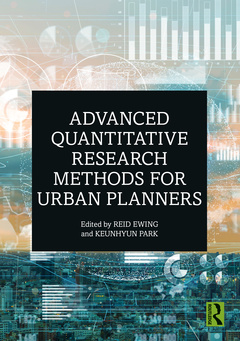Advanced Quantitative Research Methods for Urban Planners
Coordonnateurs : Ewing Reid, Park Keunhyun

Advanced Quantitative Research Methods for Urban Planners provides fundamental knowledge and hands-on techniques about research, such as research topics and key journals in the planning field, advice for technical writing, and advanced quantitative methodologies.
This book aims to provide the reader with a comprehensive and detailed understanding of advanced quantitative methods and to provide guidance on technical writing. Complex material is presented in the simplest and clearest way possible using real-world planning examples and making the theoretical content of each chapter as tangible as possible. Hands-on techniques for a variety of quantitative research studies are covered to provide graduate students, university faculty, and professional researchers with useful guidance and references.
A companion to Basic Quantitative Research Methods for Urban Planners, Advanced Quantitative Research Methods for Urban Planners is an ideal read for researchers who want tobranch out methodologically and for practicing planners who need to conduct advancedanalyses with planning data.
Chapter 1: Introduction
Companion book: Basic Quantitative Research Methods for Urban Planners
Structure of the advanced methods book
Techniques not included in this book
Data and Measurements
Conceptual Framework
Statistics
Chapter Structure
Datasets
Computer Software Used In This Book
Chapter 2: Technical Writing
Overview
Purpose
Preliminaries
Mechanics
Rewriting, Editing, and Polishing
Literature Reviews
Planning Examples
Conclusion
Chapter 3: Planning Journals and Topics
Overview
Planning Journals
Impact Factors
Peer Review
Overview of Planning Topics
Methodological Issues
Climate Change and the Natural Environment
Social Justice Issues
Land-Use and Development Regulations
Sprawl, Travel, and the Built Environment
Urban Design
Other Topics
Conclusion
Chapter 4: Poisson and Negative Binomial Regression Analysis
Overview
Purpose
History
Mechanics
Interpreting Results
Step by Step
Planning Examples
Conclusion
Chapter 5: Principal component and factor Analysis
Overview
Purpose
History
Mechanics
Interpreting Results
Step by Step
Planning Examples
Conclusion
Chapter 6: Cluster Analysis
Overview
Purpose
History
Terminology
Methodology
Step by Step
Planning Examples
Conclusion
Chapter 7: Multilevel Modeling
Overview
Purpose
History
Mechanics
Step by Step
Planning Examples
Conclusion
Chapter 8: Structural Equation Modeling
Overview
Purpose
History
Mechanics
Interpreting Results
Step by Step
Planning Examples
Conclusion
Chapter 9: Spatial Econometrics
Overview
Purpose
Spatial Data
History
Mechanics
Step by Step 1: Spatial Data Analysis
Step by Step 2: Spatial Econometrics
Planning Examples
Conclusion
Chapter 10: Meta-Analysis and Meta-Regression
Overview
History
Purpose and Mechanics
Planning Examples
Chapter 11: Mixed Methods Research
Overview
Purpose
History
Mechanics
Planning Examples
Conclusion
List of contributors
Index
Reid Ewing, PhD, is Distinguished Professor of City and Metropolitan Planning at the University of Utah, associate editor of the Journal of the American Planning Association and Cities, and columnist for Planning magazine, writing the column "Research You Can Use". He directs the Metropolitan Research Center at the University. He holds master’s degrees in Engineering and City Planning from Harvard University and a PhD in Urban Planning and Transportation Systems from the Massachusetts Institute of Technology. A recent citation analysis found that Ewing, with 24,600 citations, is the sixth most highly cited among 1,100 planning academic planners in North America.
Keunhyun Park, PhD, is an assistant professor in the Department of Landscape Architecture and Environmental Planning at Utah State University. He holds bachelor’s and master’s degrees in Landscape Architecture from Seoul National University and a PhD in Metropolitan Planning, Policy, Design from the University of Utah. His research interests include technology-driven behavioral research (e.g. drone, VR/AR, sensor, etc.), behavioral outcomes of smart growth, and active living.
Date de parution : 03-2020
17.4x24.6 cm
Date de parution : 03-2020
17.4x24.6 cm
Thèmes d’Advanced Quantitative Research Methods for Urban Planners :
Mots-clés :
Urban Heat Islands; Urban planners; OLS Regression; advanced quantitative research; LRT Station; technical writing; LRT; planning field; Regression Models; Meta-regression Analysis; Quantitative Research; Spatial Econometrics; Negative Binomial Regression; Negative Binomial Regression Models; Pedestrian Automobile Collisions; Household Travel Behavior; Literature Review; Multinomial Logistic Regression; NB; Model Chi Square Test; Random Intercept Model; Spatial Weight Matrix; Explanatory Sequential Design; SE Model; NB Model; Meta-regression Model; Smart Growth Policies; Selective Reporting Bias; Mixed Methods Research



